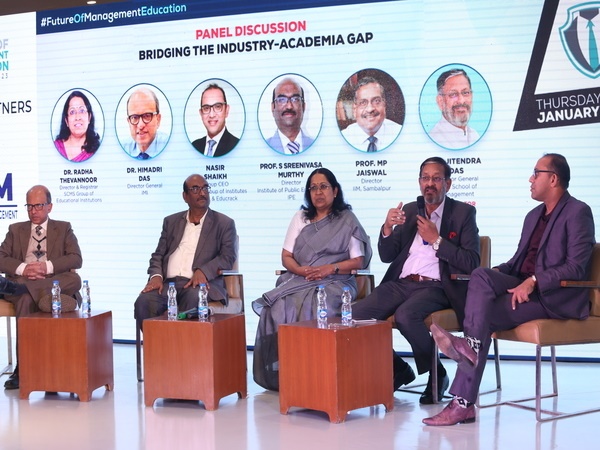FORE School of Management leads the discussion on "Bridging
Industry-Academia Gap" at Future of Management Education Conclave 2023
new Delhi (india) | Published : January 23, 2023

Business World recently organized the Future of
Management Education Conclave 2023 at the Park Hotel, New Delhi. The event saw
participation by several notable dignitaries who shared their insights on the
matter under several contextual situations. One of the themes for discussion was
"Bridging the Industry-Academia Gap," which was moderated by Dr Jitendra Das,
Director General, FORE School of Management.
The panelists for this session
included Dr Radha Thevannoor, Director & Registrar, SCSM Group of Educational
Institutes; Dr Himadri Das, Director General, IMI; Nasir Shaikh, Group CEO
Lexicon Group of Institutes, Multifit & Edutrack; and Prof. S Sreenivasa Murthy,
Director, Institute Of Public Enterprise (IPE).
Dr Jitendra Das started
the session by addressing the importance of having a discussion on the theme. He
stated, "The industry-academia interaction in the B-school domain is very
crucial. Earlier on, the recruiters typically recruited students and put them
through a training program for a year or so. Today, that is not the scenario.
They want job-ready students." "Therefore, we need to take matters in a way so
that when students get recruited, they are ready to do the job right away. This
means the students have to be prepared to be fit in terms of what is it that's
expected of them. Correspondingly, the B-schools have to finetune their
curriculums and bring in interactions with the industry."
He added, "I
recently attended a conference where they mentioned Education 5.0. This is the
introduction of new tech like ChatGPT and others in [digital] learning. In
[traditional] academies, however, the curriculum remains the same. But, since
students have to remain ready to take on the industry, we need to bring in these
kinds of elements into the curriculum and their learning experience. Now, how do
we do that? The [solution is] industry people have to commit."
Dr
Jitendra Das also shared certain standard formats that B-schools follow, such
as, regulatory-driven three-month internships, special talks, lectures, and
panel discussions by corporate members at campuses and organization of student
events where industry leaders take part as judges. He, however, added that these
standards are not enough for progress.
Taking the discussion forward,
Nasir Shaikh shared that, at Lexicon, one of the key aspects they focus on is
that B-schools operate like a corporate hub itself. He shared a similar view to
Dr. Jitendra Das in terms of bringing in industry interactions through
mentorship with young leaders and CEOs, coupled with networking skills using
digital platforms like LinkedIn, to help students learn in real-time and aid the
ways of job-readiness. He added, "Most important element is networking. I
believe it is the heartbeat of any professional out there." "The key is the more
time students spend with actual industry people, the more they learn."
Agreeing with Nasir, Dr Jitendra Das further added, "Just one caveat is that
while talking about industry-academia interaction, we end up focusing on
student's involvement in these activities. But we also need to look at another
aspect, that is, faculty's involvement. For example, with faculty getting
interned in the industry, they can be up to speed to the current practices in
the industry and deliver better in the classroom."
Other panelists also shared similar views and their own versions of
industry-academia engagement and curriculum redesigning programs at their
respective institutes.
Dr Radha Thevannoor introduced the concept of
student profiling through psychometric tests to identify skills gaps and usage
of edutech tools to track student progress on the go. She also shared how merely
changing a course nomenclature from "Excel Training" to "Business Intelligence"
changed student perspective and improved attendance.
Prof. S Sreenivasa
Murthy brought focus to the unsurety of industry leaders accepting educational
institutes' invitation to connect. So, he said, "The faculty needs to take more
responsibility in terms of building rapport with industry leaders."
Dr.
Himadri Das spoke on the common issues in curriculum restructuring, such as,
faculty's resistance to change [their approach or course format] and industry
people not speaking their minds for the fear of upsetting someone. He emphasized
the need for mindset change to be able to make the necessary and relevant
changes to bridge the industry-academia gap.
Find it Useful ? Help Others by Sharing Online
Comments and Discussions



